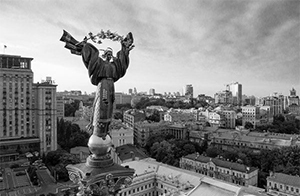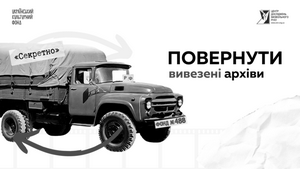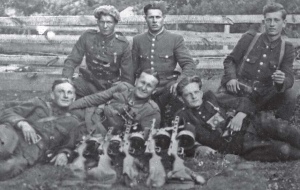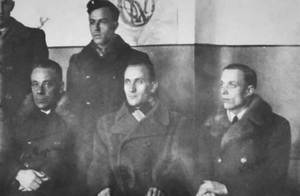Requiem for Mazepa: Why Hetman Skoroparsky Opposed the Panikhida Service
On the 9th of July a phone rang in the home of the Director of the Ukrainian Telegraph Agency Dmytro Dontsov. The Hetman was on the line. He wanted to talk about Ivan Mazepa…
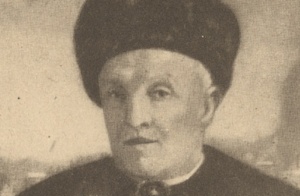
In the summer of 1918 an event happened in Kyiv that received a sudden update this autumn. As we all know, on October 11, 2018, meeting of the Synod of the Constantinople Church granted a Tomos on autocephaly of The Ukrainian Orthodox Church. Earlier this year, in September, the representative of the Ecumenical Patriarchate to the World Council of Churches at Geneva, Doctor of Theology, Archbishop Job (Getcha) of Telmessos in his interview reaffirmed that the anathema that was imposed on Hetman Ivan Mazepa by the Russian Orthodox Church in 1708 was, indeed, invalid.
It has never been recognized by the Ecumenical Patriarchate, since the anathema was used as means of political and ideological pressure against the Hetman who dared to refuse patronage of the Moscow State. The anathema, imposed with personal involvement of the Russian Tsar, had no religious, theological or canonical grounds and is considered non-canonical.
Today, most of the circumstances of this 300-year-old case have been cleared by historians and topologists. Even representatives of the Ukrainian Orthodox Church of the Moscow Patriarchate (UOS MP) recognize absurdity of many of the attendant circumstances; however, they keep delaying the process of issuing official ruling on lifting the anathema.
Meanwhile, the first steps to that end were attempted exactly 100 years ago - in the Ukrainian State of Pavlo Skoropadsky. That time the circumstances were quite similar.
On the 9th of July a phone rang in the home of the Director of the Ukrainian Telegraph Agency Dmytro Dontsov. The Hetman was on the line. He wanted to discuss the appeal to the Government submitted by "Batkivshchyna" club members.
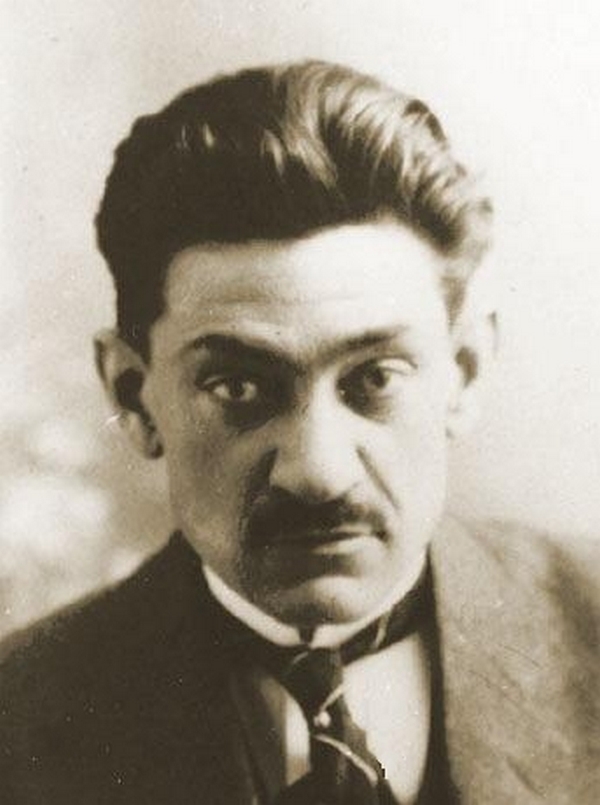 |
| Dmytro Dontsov, ideologist of the Ukrainian integral nationalism, in 1918 served as the head of the Ukrainian Telegraph Agency |
Military patriotic club "Batkivshchyna", established in 1918 by the Ukrainian Party of Socialist Independists, requested the Government to set the 10th of July as a national holiday in memory of Hetman Mazepa.
The idea was to make it an official day off. In addition, the Independists demanded for personal presence of the Government representatives at the memorial service — panikhida. Later, Dontsov made a note: "hetman told me he was willing to do anything to be a part of it".
The Hetman had previous conversation with the Metropolitan of Kyiv and Galicia Antony (Khrapovitsky) who argued that "there can be no panikhida for Hetman Mazepa, since he had ecclesiastical curse cast over him".
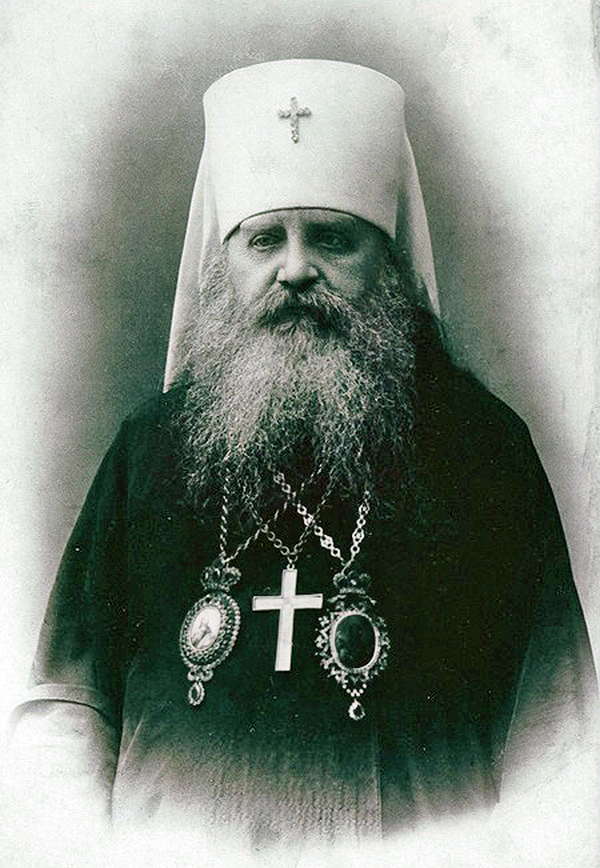 |
| The Metropolitan of Kyiv and Galicia Antony (Khrapovitsky), bishop of the Russian Orthodox Church |
Thus, any priest who performed such a service would be subject to a church trial. At the same time, Antony admitted the anathema imposed on Hetman Mazepa to be unfair, so he agreed to sign a telegram to the Patriarch Tikhon of Moscow requesting to remove the curse.
Sure enough, this idea was reasonable, but it would take too much time to implement. There was no chance of receiving the Patriarch's ruling on the matter before the panikhida service (July 10).
That same day, at 10 pm in the "Hetman's palace" (40 Instytustska St.) a cabinet meeting was held. The meeting was attended by 19 persons, headed by Fedir Lyzogub, secretary — V. Ditiatyn.
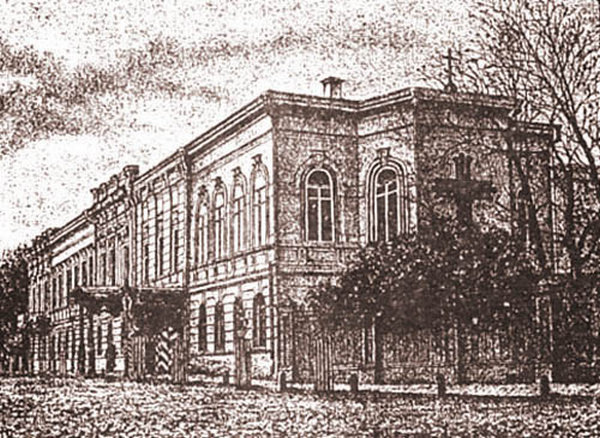 |
| Hetman's Palace |
There were six different issues on the agenda; however the meeting started with extraordinary announcement by the Chairman of the Council of Ministers about the panikhida service for Hetman Mazepa.
Hetman Government arrived at rather interesting compromise solution. The Council of Ministers unanimously recognized that "the memorial day of Hetman Mazepa, whose national and patriotic role in the history of Ukraine remains controversial, cannot be considered a national holiday".
Thus, there were no grounds for making this date a day off. However, to avoid accusations of the believers' rights infringement, the cabinet ruled to recommend the heads of governmental institutions to allow their employees to take some time off for the memorial service, if they wished to attend it.
The only condition for taking part in the service was immediate return to one's duties upon panikhida completion. To avoid public disturbance, the cabinet also issued a ban on any kind of demonstration following the service.
11 members of the government voted in favor of this resolution. Only 2 cabinet members voted against. Moreover, special note in the minutes specified that the members of the Cabinet shall not attend the panikhida service on July 10.
That same day there was a regular meeting of the All-Ukrainian Church Council. Metropolitan Antony informed the members about the appeal to the Patriarch Tikhon on lifting the anathema from Ivan Mazepa.
Still, since there was no Patriarch's decision on the matter no priest was allowed to conduct the panikhida service. However, the very next day Metropolitan Antony blessed Bishop Nazariy on performing the church ceremony in honor of Hetman Mazepa.
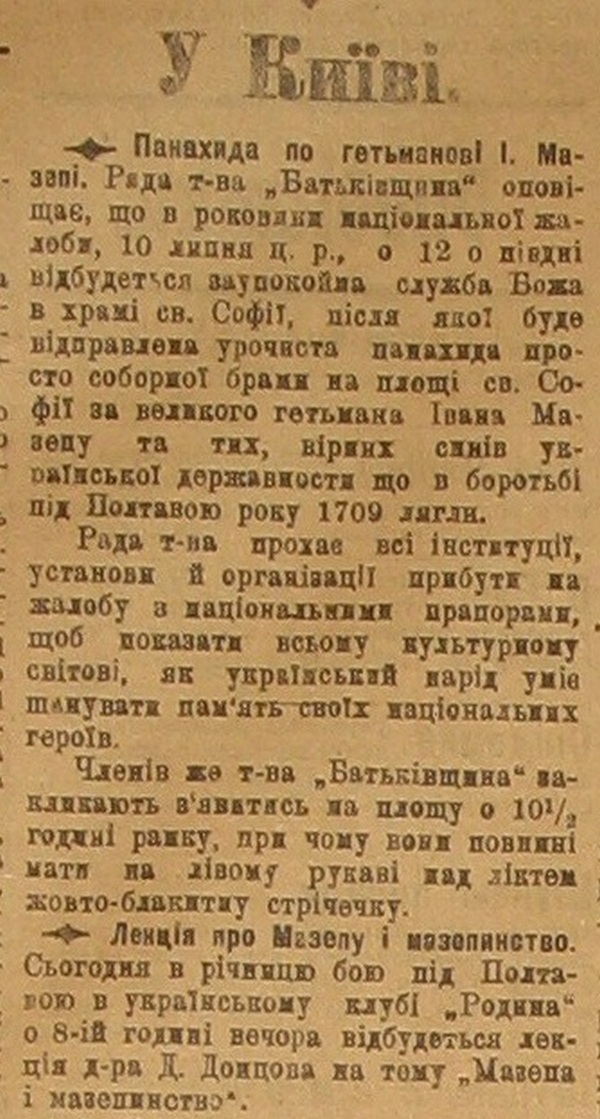 |
| Newspaper announcement of panikhida service for Mazepa |
Panikhida service was performed. It was the second time during the revolution that the church service was performed for Mazepa in spite of anathema. In summer 1917 such church service was conducted at the frontline, at Bogdan Khmelnytsky Regiment, in the village of Rosokhuvatets in Galicia.
People stared gathering at St. Sophia square an hour before the start of the service — dressed in national clothes, they were carrying national banners and portraits of Ivan Mazepa.
Militia was maintaining order:
"Group of Ukrainians noticed that one of the mounted militia officer was wearing Moscow cockade and stated to yell at him to take it off. Separate voices were shouting: with Moscow cockade — go away to Moscow!"
"Among the yellow-on-blue flags there is one with black ribbons inscribed: "Memory Eternal to the fighters who died for the Ukrainian freedom" — stands out from the rest of the banners. People are crossing themselves looking at this banner, some of them cry".
The Requiem Mass was performed outside — there would not been enough place to fit all the people in the church.
Priest Makariy Kramarenko was the first to speak: "Happiness of Ukraine, its independence are yet to be gained and we will have to fight for that, brethren! So let us be faithful sons to our Mother Ukraine!"
The service started after the speech. It was performed by Bishop Nazariy accompanied by the National Choir of Kyrylo Stetsenko.
According to the organizers, the celebration was attended by ten thousand Kyivites.
There was a rally after the service. Chaplain Antoniy Mateyuk and a participant of the Battle of Kruty Valetyn Otamanovsky gave a speech.
This is how newspaper "Kievskaya Mysl" described the service: Yesterday, on July 10 (June 27), on the anniversary of the Battle of Poltava, Requiem Mass was conducted at St. Sophia Cathedral.
About 2000 Ukrainians carrying Ivan Mazepa portraits and national flags gathered on cathedral premises.
Upon the Liturgy, the priesthood stepped out of the church and it was right here, under the open sky in front of the central gates, that his Holiness Nazariy conducted celebratory panikhida for Hetman Mazepa and all of the fallen in the Battle of Poltava. During the service two Ukrainian priests spoke about Mazepa. The Choir and the congregation sang "Memory Eternal". And then they sang the Ukrainian anthem".
Meanwhile, Dontsov wrote in his diary: "Our Mazepa rally was a success. There were lots of people in the Cathedral and at St. Sofia square. Panikhida — probably the first after the cast of anathema — was conducted by several priests lead by Bishop Nazar.
Then there was a procession. The Cabinet compromised itself, as well as the higher clergy, by not showing and forbidding the Ministers to take part in the panikhida. That day I was at Doroshenko's. He said he defended the cause of panikhida at the Minister's Council. But he didn't come to St. Sofia memorial service – as he says — bound by the Council decision... My word on Mazepa and his movement at the Club was a success".
Viktor Andriyevsky, who had just arrived to Kyiv to take part in the All-Ukrainian Assembly of Education Commissars, made very detailed written note regarding that day:
"… initiative of panikhida belongs to the Head of the Kyiv District Council S. Petliura, and upon the service there should be a huge demonstration in memory of Mazepa, and the main idea to that end is to manifest consolidation of the Ukrainian national forces, as a protest against Moscow-oriented policy of the Government.
As one of the episodes of demonstration – there should be celebratory shatter of those granite words, inscribed on B. Khmelnytsky monument: To Bogdan Khmelnytsky from one and indivisible Russia.
Our guys will carry hammers and upon the ceremony we will storm the monument and in a blink of an eye – bang-bang on that "one and indivisible!"...
Crowds of people move along Volodymyrska Street. Many have yellow-and-blue rosettes on. Lots of Ukrainian outfits. Some march along with their own banners. I am happy to see groups of workers as well. This is truly a national, people's celebration!
…
I keep waiting for the Hetman to arrive. He's not here. Perhaps, he is late? Perhaps some urgent state affairs are keeping him busy? Perhaps he will still come?
…
But the Hetman is not here… The hope is fading… And really – would it be appropriate for the tsar's loyal general, for the faithful servant of the All-Russian Emperor to manifest his respect to a "traitor", a "separatist"?"
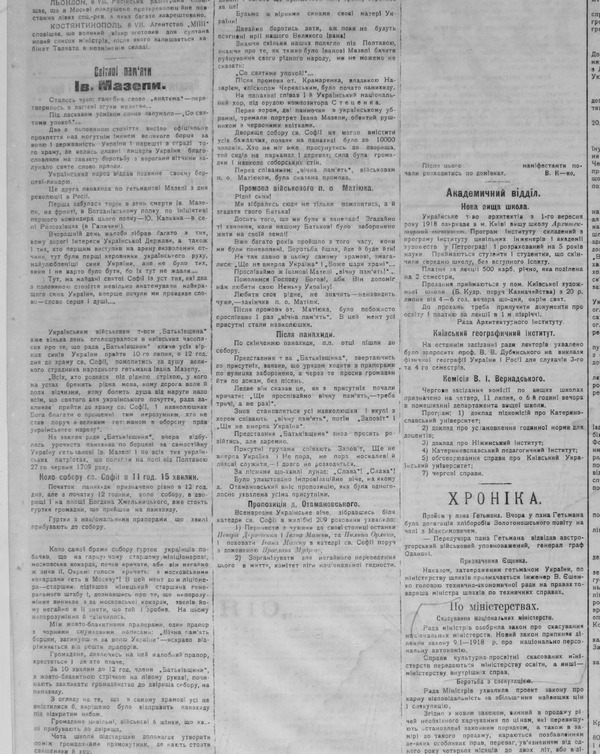 |
| "Vidrodzhennia" newspaper's account of panikhida service. Some of the text was censored out |
"Vidrodzhennia" newspaper wrote: "It was a miracle: shameful word "anathema" turned into a tender sound of prayer… Under a gentle smile of the sun sounded the chant — "with the saints, grant him rest o Lord, memory eternal!"
…
Here, at the St. Sophia Square from the lips of those, who have involuntarily, for two and a half centuries sang anathema to the best of Ukraine's sons, for the first time, we heard the word of truth — the word coming from the depth of heart and soul…"
So what had happened in summer of 1918 that made Hetman Skoropadsky and his Government oppose Requiem Mass for Ivan Mazepa?
The question, in fact, is not that simple. Let's try to figure it out and set the record straight.
As was noted by Mykola Andrusiak, who re-printed the Council of Ministers' decision in Lviv newspaper "Litopys Chervonoyi Kalyny", after the Panikhida the national Ukrainian council (viche) ruled "to move the remnants of Petro Doroshenko, Ivan Mazepa and Pylyp Orlyk from strange land back home to our capital, and bury them in St. Sophia Cathedral next to Yaroslav the Wise ".
Hetman's Government ignored this decision, which raised lots of questions at the time. So why did Hetman Skoropadsky and his government officials resist the idea of celebrating memory of Ivan Mazepa? Did Skoropadsky loathe Mazepa so greatly that he could not get over this hate even in the face of public pressure?
In the end of the 1930th Skoropadsky wrote down memories of his childhood years spent in Ukraine at his Grandfather Ivan Mykhailovych Skoropadsky's estate at Trostyanets. In those notes Pavlo Skoropadsky left an interesting view of his understanding of Ukrainians, his memories of Mazepa and peculiarities of religious life of his "small motherland".
Pavlo Skoropadsky, among other things, noted that he received the first idea of Ukraine from his Grandfather. Although, it was rather a memory of a dear glorious past.
He had no political perspective of revival of the State of Ukraine. The Skoropadskys family was loyal to the Russian monarchs, though they understood, they were not "Velykoross" (term used for Moscow territory population), but "Maloross (term used for Ukrainian population) of noble birth".
Ancient portraits of hetmans and various political and cultural Ukrainian figures decorated the walls of their Trostyanets home, along with several images of "Cossack Mamai".
Ukrainian songs and bandura music often played in the house, the family was subscribed to famous newspaper "Kievskaya Starina", read and discussed works by Kostomarov and others.
Among other portraits of hetmans, there was a portrait of Mazepa, who, according to Pavlo Skoropadsky, was "deeply hated by all Russians".
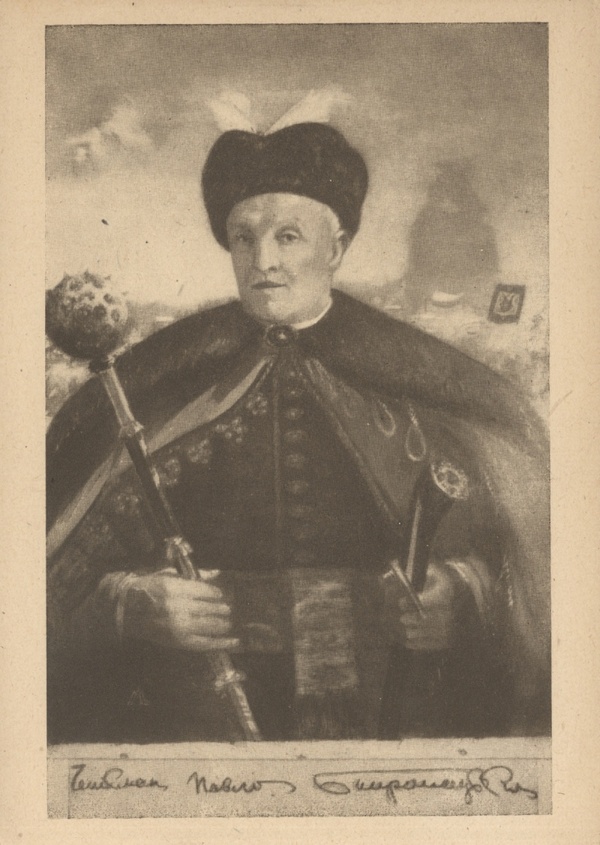 |
| Hetman Pavlo Skoropadsky, interwar period postcard |
The family, according to Skoropadsky, did not revere Mazepa, unlike many conscious Ukrainians in the beginning of the 20th century, who perceived Mazepa as the symbol of Ukrainian independence.
However, the Skoropadskys "silently sympathized with him". Moreover, the family of the future head of the Ukrainian State resented the fact that up until that time cathedrals continued casting anathema on Mazepa before the Great Lent.
They also mocked the fact that in Kyiv they were casting anathema on Mazepa at St. Sophia Cathedral, and at the same time prayed for salvation of his soul, as the Monastery founder, at St. Michael's Golden-Domed Monastery.
In addition, the Skoropadskys followed old Ukrainian traditions not only in their everyday life, but also in religious rites, that differed from those practiced in Russia.
So, in the absence of strong negative feelings towards Mazepa and with the understanding of absurdity of anathema, why did Pavlo Skoropadsky and his Government oppose the panikhida service?
The answer to this question was in part provided by Hetman himself in 1919, after he immigrated to Germany. In his memories of 1917-1918 there is no individual record on the events of July 1918.
However, Skoropadsky wrote down his reflections on the essence and complexities of religious issue, that he had to deal with from the very first day of becoming a Hetman.
It was the issue of the Autocephalous Ukrainian Church that might shed light on Hetman's position regarding requiem for Mazepa.
So, in the times of the Ukrainian Central Council (Rada), a Church Board was created, which was compiled of different "elements". On the one hand, there were several liberal Ukrainian priests, who considered Ukrainian priesthood to have been oppressed by the higher church authorities, and felt urgent need to appoint exclusively Ukrainians as higher spiritual hierarchs in the future.
On the other hand, there were several defrocked priests, several priests who lacked in reason and sanity, according to Hetman, and even a few soldiers.
This made the Church Board rather a revolutionary establishment, than a spiritual one, since it took into account neither church canons, nor legal framework. The Board was even willing to use physical force if necessary.
Meanwhile, the Board decisively led the struggle against the higher church leaders who, at the time, were almost exclusively Russians. The Board also advocated for use of the Ukrainian language in church services, and other church affairs.
But the main objective of the Board was to detach the Ukrainian Church from patronage of the Moscow Patriarchate – meaning autocephaly. The Church Board initiated the assembly of the All-Ukrainian Orthodox Church Council.
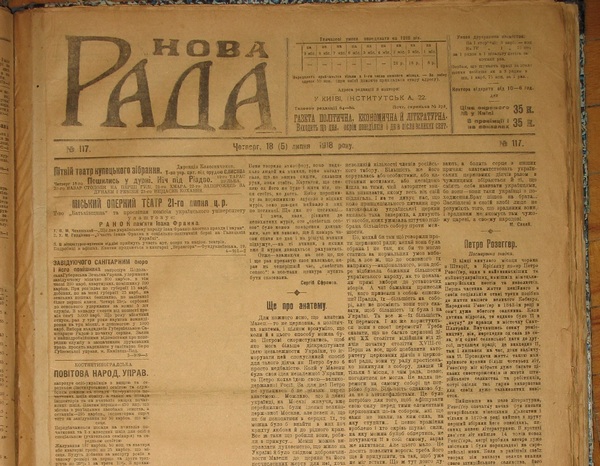 |
| The first page of "Nova Rada" newspaper with an article "Few more words about anathema" by M. Syvy. The article is dedicated to Ivan Mazepa |
There even was an idea that the Patriarch of Constantinople and the Patriarch of Antioch would take part in the Council. However, the Council work was interrupted when the Bolsheviks captured Kyiv. The Metropolitan Volodymyr was murdered in Kyiv Pechersk Lavra.
Upon return of the Central Council (Rada) to the capital, the Church Council meetings were scheduled for the beginning of May.
There was an issue of election of the new Metropolitan. Father Nikodym, appointed as interim Metropolitan to Kyiv, along with his supporters did not want to see as Metropolitan anyone who had sympathy of the All-Ukrainian Orthodox Church Council or the Church Board.
That's why most of the bishops were opposed to the Council assembly. They argued that the Council was illegal. Their opponents, on the other hand, argued that not convening the Council means neglecting the interests of Ukrainian people. In this situation Skoropadsky decided to convene the Council, especially since the idea was also supported by the Patriarch Tikhon of Moscow.
Meanwhile, Hetman was extremely scared of a church split. He assumed that two churches might emerge on the territory of Ukraine: the one — with the Moscow Patriarchate — centered in Kyiv, the other — Ukrainian, spread all over the country.
Russian priesthood insisted that Kharkiv Reverend Antony be elected as the Metropolitan. However, when the Patriarch sent him to Kyiv, Skoropadsky was not happy with this decision, considering it erroneous. Hetman invited 13 bishops to his office and demanded to set the date for the Congress. The date was set at July 7.
The Council of Ministers had nothing against the appointment of Antony as the Metropolitan of Kyiv; however the cabinet considered it necessary to transfer the final appointment to the decision of the Church Council, so that "the people would be able to decide on this issue, sensitive to any orthodox believer".
Few days before the election, a celebratory service attended by Hetman was held at St. Sophia. Hetman wrote that several "beautiful speeches" were made in this service, one of which — by Antony. As a result, the Council approved him as the Metropolitan.
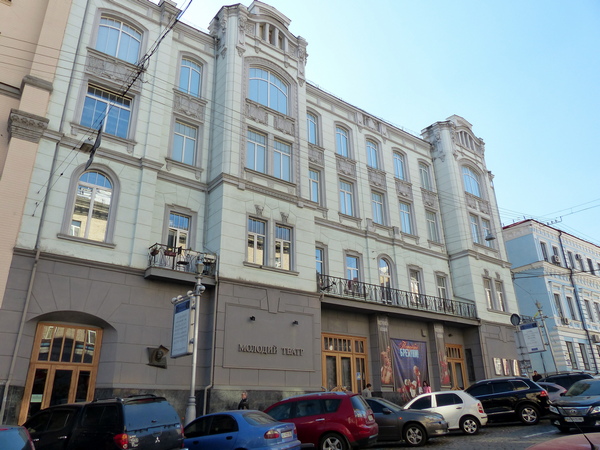 |
| Building where in 1918 was located the headquarters of "Batkivshchyna" Society that organized panikhida service for Ivan Mazepa |
The head of the state often met with the Metropolitan. In general, Hetman considered Antony an outstanding and reasonable man, however called him an "old school black-hundredist" who knew no other methods of spreading Orthodoxy except for imprisonment and execution, or turning to police to influence people.
The Metropolitan was unable to gain sympathy with the Ukrainians. Hetman had to maintain friendly relations with him, but did not share his views.
Contemplating on the issue of possible church split and autocephaly, Skoropadsky described himself as a true believer. That's why he was unhappy with the outcome of the many years of Russian policies on the Orthodox Church.
According to Skoropadsky, the fate had been oppressed, everything that used to be alive was killed, and all that used to be sacred was lost. The only thing that remained was a deathlike ritual. The Church was headed not by believers, but by bureaucrats. Even such an outstanding, according to Hetman, person, as the Patriarch Tykhon, was not even close to understanding the Ukrainians, or their needs.
That's why the Church needed wide decentralization. All the Church affairs must be decided upon in Ukraine, whereas, the connection with the Moscow Patriarchate must be purely spiritual — via the Patriarch.
The higher priesthood would be appointed from the local clergy. The village priests would get educational and spiritual support. People from outside, meaning from Russia, did not understand these nuances, and were unable to sympathize with Ukrainians.
At this point Hetman agreed with the so called conscientious Ukrainians. However, the latter demanded autocephaly of the Church, while Hetman was opposed to it. He sincerely thought it would be the autocephaly that splited the church, not realizing that the church had already been split, and that autocephaly had huge unifying potential.
There were few reasons why Hetman resisted the Requiem Mass for Mazepa, and, correspondingly, removal of the anathema.
First, there was a certain bias regarding the the very figure of Ivan Mazepa. Skoropadsky acknowledged his high status, but never admitted his importance as a historical figure. Members of his Cabinet adopted the same attitude as their leader.
Second, despite his understanding of the existing difference between the Ukrainian and Russian Orthodoxy, Skoropadsky failed to see the use of autocephaly, since he never pictured Ukraine outside the federation with Russia.
Third, though Hetman considered the Metropolitan to be a black-hundredist, he refused to argue with him, or enter into an open conflict with the Patriarch Tykhon on the issue of anathema removal or serving panikhida for Mazepa.
At the same time, Hetman did not want to alienate pro-Ukrainian activists, so he delegated this responsibility to the Council of Ministers.
The Cabinet, in its turn, by refusing to set this date as an official holiday, made this issue personal — now everyone had to decide whether to take part in the memorial service.
However, the Cabinet clearly signaled its position by forbidding its members to take part in the service.
The matter is, that the second issue on the agenda that day was "arrangements for celebrating Mr. Hetman's Saint's Day".
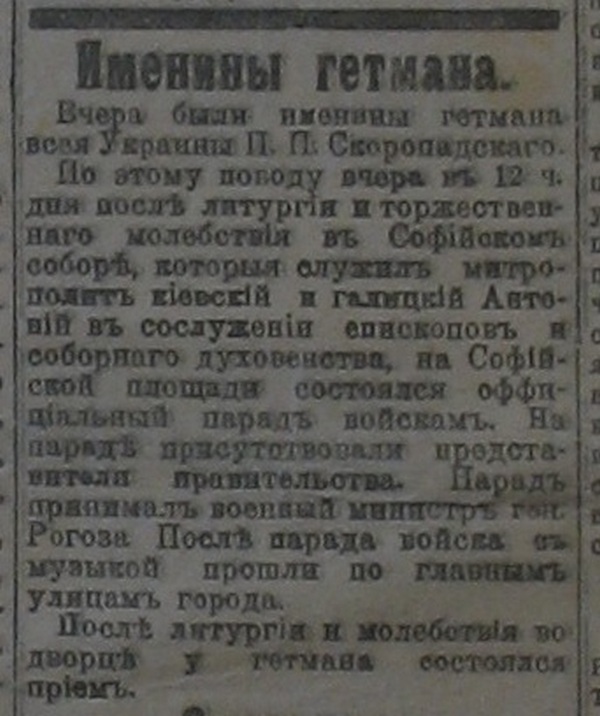 |
| Newspaper announcement for Pavlo Skoropadsky's Saint's Day celebration on July 12, 1918 |
And while the Cabinet members refused to make 10th of July a national holiday and official day off, they announced an official day off on July 12 – the Feast of St Peter and Paul.
All the cabinet members were ordered to come to the celebratory service at St. Sophia Cathedral.
Finally, as we mentioned in the beginning of our story, in September 2018, the representative of the Ecumenical Patriarchate to the World Council of Churches at Geneva Archbishop Job (Getcha) of Telmessos said the anathema was non-canonical.
Meanwhile, the issue of autocephaly of the Ukrainian Orthodox Church that bothered Pavlo Skoropadsky in 1918, and that made him oppose the Requiem Mass for Mazepa, will finally get positive conclusion in the nearest future.
